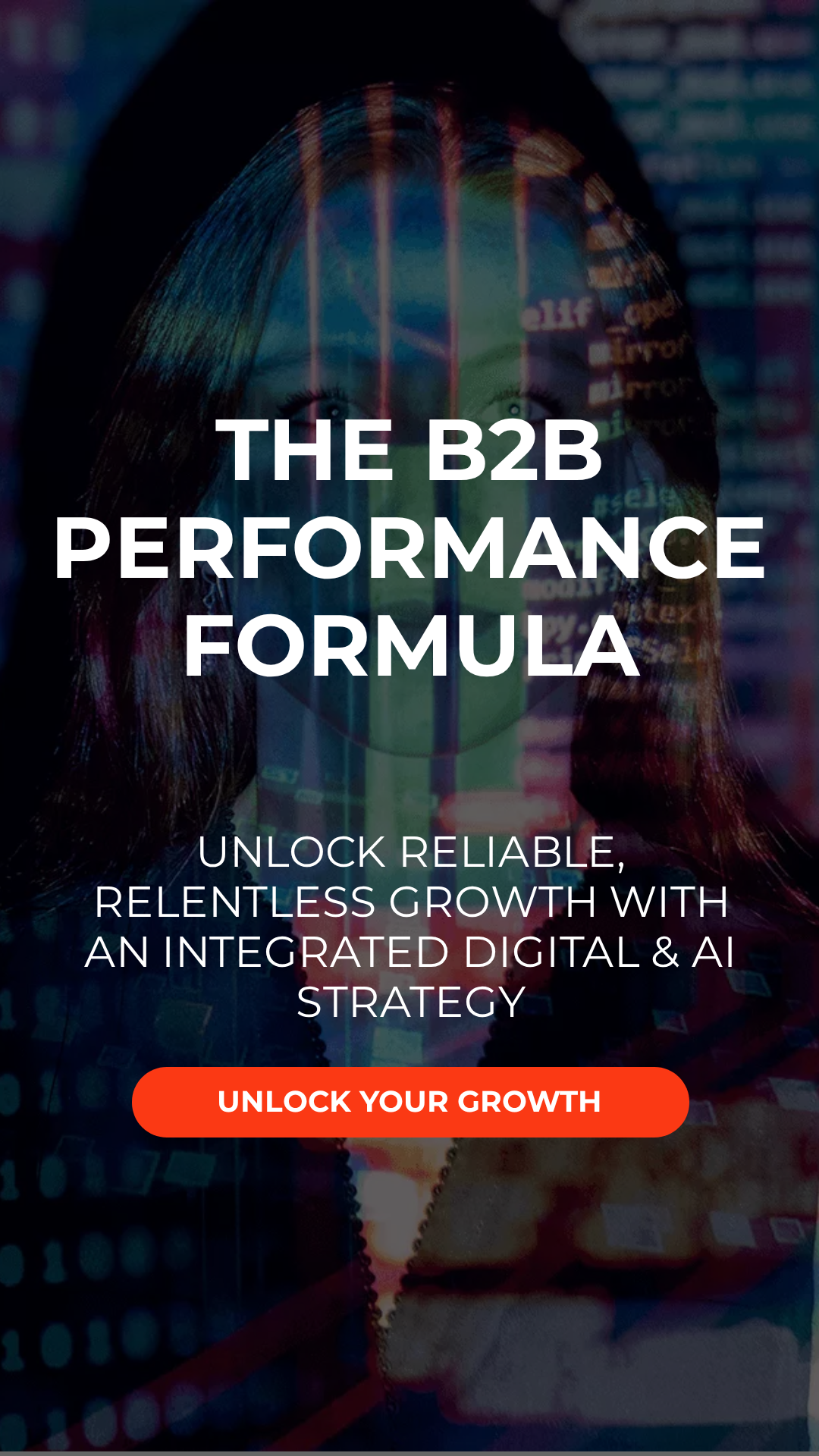Marketers must act on GEO now because AI assistants increasingly answer searches and cite only a few trusted sources. If your pages lack extractable answers, schema, and clear sourcing, you will be excluded, lose discovery traffic, and face higher acquisition costs. GEO makes your expertise quotable and visible inside AI results.
AI-powered search is reshaping how people discover information. Where users once scrolled through a list of blue links, they now receive synthesised answers from assistants such as ChatGPT, Perplexity, and Google’s AI Overviews. These systems quote and reference only a limited number of trusted sources.
That means your content can still “rank” on Google yet fail to appear in the answers that users actually read. Forbes (May 2024) reports that websites relying on informational search traffic have seen an 18–40 % drop in organic clicks following the rollout of AI Overviews.
For B2B organisations, that translates to fewer discovery visits, fewer branded searches, and increased dependence on paid visibility.
Generative Engine Optimisation (GEO) directly addresses this shift – ensuring your expertise appears inside AI-driven results where questions are answered, not just listed.
Why this matters now
The urgency around GEO is not hype – it’s grounded in observable behavioural and structural change.
- Search behaviour is fragmenting. Gartner (2025) predicts that by 2026, one-quarter of all search sessions will take place through AI assistants rather than browsers. Users now start, refine, and verify answers within tools such as ChatGPT, Perplexity, and Copilot before they ever open Google.
- Zero-click outcomes are rising. Semrush / SparkToro (2024) data shows that around 65 % of Google searches now end without a click, as AI-generated answers satisfy intent directly on the results page.
- Authority is consolidating. In emerging LLM ecosystems, early optimisers are cited far more frequently. SEOFOMO’s State of AI Search Optimisation (2025) found that brands implementing structured Q&A and schema were five times more likely to earn assistant citations.
- Budgets are tightening. Paid acquisition costs are rising 20–30 % year-on-year across many sectors. WordStream (2025) benchmark data shows average B2B CPC inflation of 23 %, making organic visibility inside AI results critical to control customer-acquisition costs.
For most organisations, even a modest 15–20 % decline in organic visibility can translate into thousands of lost visits each month – often at the top of the funnel where trust begins. If just 15 % of your organic traffic shifts to AI answers, that could remove hundreds of leads per month unless your content earns citations inside those answers.
GEO provides a proactive safeguard, helping your brand remain part of the verified sources that AI systems choose to quote – and that users choose to trust.
“We’ve been working on GEO for over a year and we are now seeing conversions attributed directly to LLMs such as ChatGPT. What is most interesting is that traffic arriving via AI is often further down the funnel and ready to convert, because users have already found the informational content they needed.”
Ashley Salek, Agency Director, Seventh Element
What GEO is – and why it’s different
Generative Engine Optimisation makes your content easy for AI systems to find, understand, and quote.
It extends SEO by focusing on clarity, sourcing, and structure – the signals that allow assistants to surface your material safely within generated answers.
| Focus area | SEO focus | GEO focus |
| Goal | Rank in SERPs | Be cited or referenced in AI answers |
| Primary signals | Keywords, backlinks, dwell time | Clear Q&A pairs, citations, schema, recency |
| Format | Long-form keyword-led content | Structured, extractable sections for understanding |
| Outcome | Visibility via rankings | Visibility via inclusion in trusted summaries |
Well-executed GEO ensures that your brand’s expertise underpins the answers AI systems provide – protecting both visibility and trust as click-through opportunities shrink.
Why act now
- Traffic is already shifting. Between 15 % and 30 % of informational search traffic is now being captured within AI-generated results.
- Trust signals take time. Assistants favour consistently sourced, regularly updated content.
- Measurement maturity is low. Establishing proxy KPIs early gives you a head start before full analytics arrive.
- The resource gap is wide. Only about a third of marketers feel confident in GEO, and fewer than 10 % have allocated dedicated resource.
GEO is not a distant trend – it is a 2025 priority. Acting early allows teams to experiment, measure, and iterate before AI-answer visibility becomes a crowded space.
What the industry is saying
Marketers widely acknowledge AI search visibility as critical but lack clear process or ownership.
Surveys through Search Engine Land and SEOFOMO show alignment around three practical priorities:
- Deploying schema and structured data.
- Writing extractable Q&A content.
- Embedding transparent sourcing practices.
Adoption remains uneven, creating an opportunity for early movers to lead within their categories.
Shifting behaviour you must plan for
Search journeys are now conversational and non-linear.
- Multi-touch verification: Users confirm AI-generated information through secondary tools such as Google, Reddit, or LinkedIn, fragmenting attribution.
- Zero-click experiences: Assistants increasingly satisfy intent without a site visit.
- Trust through transparency: Content with visible sources, publication dates, and author credentials is far more likely to be cited.
GEO positions your organisation’s expertise within these multi-touch, multi-platform paths – ensuring you remain visible even when clicks are no longer guaranteed.
Common barriers to adoption
- Knowledge gaps: GEO spans SEO, content, and PR. Deliver short internal training and add GEO checks to your QA process.
- Resourcing: Frame GEO as demand protection to justify investment. Quantify the revenue impact of declining non-brand traffic.
- Measurement: Use proxy metrics such as percentage of optimised pages, observed citations, and unbranded conversions.
- Trust signals: Attribute content to real experts, show update dates, and link key claims to primary sources.
How brands should prepare
- Audit for AI-friendliness: add concise answer blocks, question-led headings, and visible authorship.
- Structure the page: apply relevant schema, simplify extraction with lists and tables, and ensure consistent entity naming.
- Write for prompts, not keywords: answer what, why, how, and what next clearly.
- Strengthen authority: include primary data, publish short benchmarks, and secure third-party mentions.
- Measure simply: track schema coverage, assistant citations, rich results, and unbranded conversions.
- Coordinate teams: define clear ownership across SEO, content, analytics, and PR.
Real-world use cases and emerging trends
- Assistants as default gateways: ChatGPT, Perplexity, and Copilot are already absorbing “what is” and “how to” queries; cited brands maintain visibility even as organic clicks decline.
- Converging tactics: Schema, inline citations, and structured Q&A formats are becoming baseline GEO practice.
- Cross-platform journeys: Research from Yext (2025) shows that 48% of users cross-check answers across platforms, underlining the need for message consistency across owned and partner channels.
- Authority compounds: Once assistants trust a source, that trust persists – early adoption delivers cumulative advantage.
- Privacy and transparency: Visible consent and minimal data use reinforce reliability with both users and algorithms.
Risks of ignoring GEO
| Risk | How it manifests | Commercial impact |
| Visibility loss | Competitors appear in AI answers while your pages are bypassed | Reduced discovery and reach |
| Declining ROI | Informational pages lose organic sessions | Lower lead volume |
| Trust gaps | Outdated or unsourced content excluded from summaries | Weaker credibility |
| Higher costs | Paid channels fill the visibility gap | Rising CAC and marketing inefficiency |
A 30-day GEO starter plan
Team: SEO Lead, Content Lead, Analytics Lead, optional PR support
Tools: CMS, schema plugin or manual markup, analytics dashboard, shared tracker
Week 1: Content & credibility
Add 40–60 word answer blocks, rewrite headings as questions, place inline citations, and display author + updated date.
Week 2: Structure & schema
Apply Article and FAQPage schema, validate markup, and maintain consistent entities.
Week 3: Authority & distribution
Add one original insight or benchmark per page, seek a third-party mention, and repurpose each answer block as a short LinkedIn post linking back to the source page.
Week 4: Measurement & iteration
Track answer-block and schema coverage, observe citations, monitor unbranded conversions, and test answer length.
Expected outcomes: 10-30% lift in rich results, multiple new citations observed, and all ten pages refreshed within the month.
Maintaining momentum
- Monday: confirm pages and roles
- Tuesday: refine answers & FAQs
- Wednesday: verify citations & authors
- Thursday: validate schema
- Friday: publish, log KPIs, promote socially
Extend this cadence to new pages and run quarterly GEO audits.
Conclusion
Generative Engine Optimisation is the natural evolution of SEO. It rewards accuracy, transparency, and clarity – the same principles that drive user trust.
By making your content easy to quote, properly sourced, and regularly updated, you protect both visibility and authority in an AI-driven landscape. Beyond traffic, GEO safeguards your brand’s role as a credible voice in your sector – ensuring you remain part of the answers that shape decisions.
Author information
With 15 years of hands-on SEO and digital marketing experience, agency director Ash is the driving element behind our digital team. Ashley heads our digital execution team, delivering innovative strategic and tactical marketing initiatives and campaigns; helping propel our clients’ growth and success.
Learn more about Ashley Salek, Agency Director, Seventh Element

















